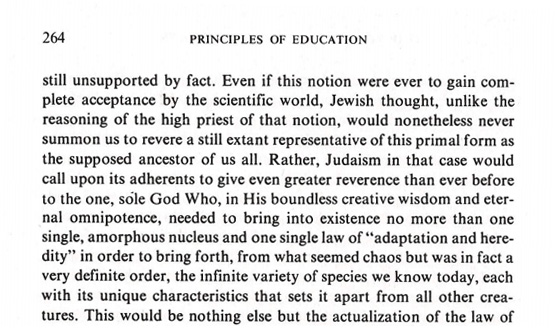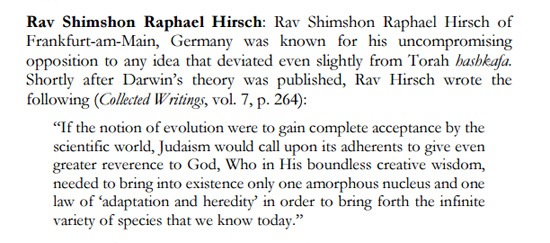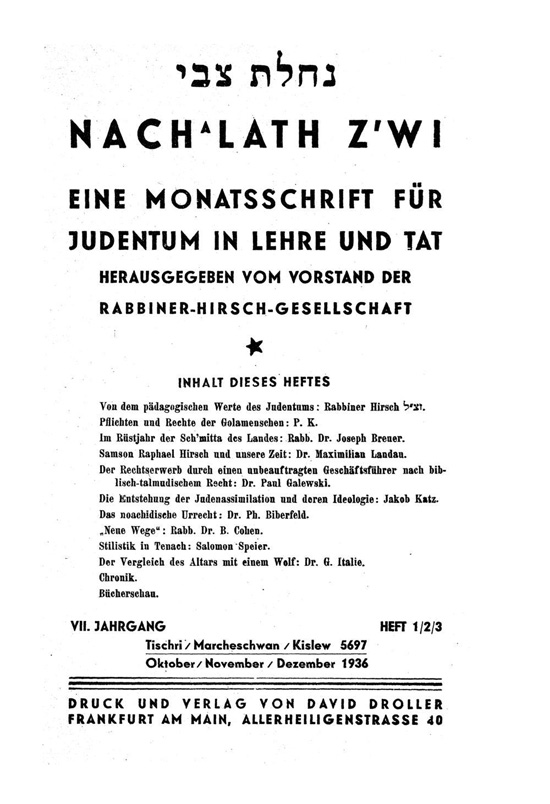Text Manipulation on the Left – A Recent Incident
Text Manipulation on the Left – A Recent Incident
by Yisrael Kashkin
We have seen on this blog several posts that cite examples of censorship and text manipulation in literature within the Orthodox community. Generally, the practitioners of this tendentious editing have been described here as being among our brethren from the right wing of the community. However, the act of text manipulation happens as well among our brethren from the left wing.
One notable example occurred recently in an article that discussed the theory of evolution. The article, Nathan Aviezer’s “The Origin of Mankind – A Torah Perspective” (Hakirah, Vol. 18), lists Rav Samson Raphael Hirsch (1808-1888) as one of “many Torah authorities” whose writings indicate that “the Torah and evolution are completely compatible.” Aviezer asserts that “Darwin, Rav Hirsch, Yehuda HaLevi, and Rav Kook all viewed evolution as the mechanism used by G-d to produce the animal kingdom.” In its conclusion, the article reasserts its claim with the words “Theologians refer to the idea of evolution being orchestrated by G-d as ‘theistic evolution.’ This concept is accepted by many Torah luminaries, including Yehuda HaLevi, Rav Kook, and Rav Hirsch (as quoted above).”
What is this quote from Rav Hirsch? The article offers the following statement and purports it to be a quote from an essay in Hirsch’s Collected Writings:
If the notion of evolution were to gain complete acceptance by the scientific world, Judaism would call upon its adherents to give even greater reverence to God, Who in His boundless creative wisdom, needed to bring into existence only one amorphous nucleus and one law of ‘adaptation and heredity’ in order to bring forth the infinite variety of species that we know today.
Those words, which actually are not an accurate quote of Rav Hirsch as I will show, do not constitute agreement with the theory of evolution. They say only that if the theory is accepted universally by the scientific community that one could look at it as describing a Divine wisdom utilized during the creation of animal species. This does not mean that Rav Hirsch looked at it that way.
How did Rav Hirsch regard the theory of evolution? In the same essay that the article cites as a source for its statement, Rav Hirsch explicitly expresses his view on the veracity of the theory. After asserting that man’s attempts to explain natural laws “does not alter his moral calling,” Rav Hirsch tells us the following:
This will never change, not even if the latest scientific notion that that genesis of all the multitude of organic forms on earth can be traced back to one single, most primitive, primeval form of life should ever appear to be anything more than what it is today, a vague hypothesis still unsupported by fact. (“The Educational Value of Judaism,” written in 1873, in Collected Writings of Rabbi Samson Raphael Hirsch, Volume VII, pp. 263-4)
The theory is a “notion” and a “vague hypothesis still unsupported by fact.” Rav Hirsch’s skepticism is unequivocal.
Rav Hirsch embraced science, writing “Judaism does not fear the advances of science; in fact, it rejoices in them and hails them with high hopes for the future.” However, he required that we “distinguish between facts and hypotheses, between premises that have stood the test of time and hasty conclusions often based on half-truths ….” (p. 257) Charles Darwin’s book On the Origin of Species was first published in 1859.
However, there is another problem with the article. Aviezer states that Rav Hirsch’s words can be found in the Collected Writings of Rabbi Samson Raphael Hirsch, Volume VII, p. 264 and even presents them as a verbatim statement within quotation marks. However, these words do not appear verbatim on page 264 (in either the 1992 or 1997 editions), but rather they appear to be drawn from different parts of the page and to be sown together without the customary ellipses (i.e., …) to indicate omitted material. The actual text from page 264 is as follows:
Even if this notion were ever to gain complete acceptance by the scientific world, Jewish thought, unlike the reasoning of the high priest of that notion, would nonetheless never summon us to revere a still extant representative of this primal form as the supposed ancestor of us all. Rather, Judaism in that case would call upon its adherents to give even greater reverence than ever before to the one, sole God Who, in His boundless creative wisdom and eternal omnipotence, needed to bring into existence no more than one single, amorphous nucleus and one single law of “adaptation and heredity” in order to bring forth, from what seemed chaos but was in fact a very definite order, the infinite variety of species we know today, each with its unique characteristics that sets it apart from all other creatures.
Rav Hirsch adds that “This would be nothing else but the actualization of the law of le-mino, the ‘law of species’ with which God began His work of creation. This law of le-mino, upon which Judaism places such great emphasis in order to impress upon its adherents that all of organic life is subject to Divine laws, can accommodate even this ‘theory of the origin of species.’” [1]
If written with the customary ellipses, the passage as quoted in the article becomes unusable for a citation:
if … [the] notion [of evolution] were … to gain complete acceptance by the scientific world, …. Judaism … would call upon its adherents to give even greater reverence … to … God[,] Who … in His boundless creative wisdom[,] … needed to bring into existence … [only] one … amorphous nucleus and one … law of ‘adaptation and heredity’ in order to bring forth … the infinite variety of species [that] we know today ….[2]
With fourteen gaps within two sentences, albeit long sentences, the passage would be suspect as a proof text even if it seemed to concur with the theory of evolution.[3]
The lacunae are significant. Missing is Rav Hirsch’s biting allusion to Darwin as “the high priest of that notion,” suggesting that Darwin’s theory is more mythological than scientific. Rav Hirsch also contrasts Darwin’s reasoning from Jewish thought by saying that Judaism would never conclude as Darwin did that man descends from a “still extant representative of this primal form,” an apparent reference to the ape.
Missing also are the words “Even if,” words that contribute to the tenor of the relevant portion of Rav Hirsch’s essay, which is that this new theory along with other increasingly popular ones in the 19th century, does not uproot the Torah. Rav Hirsch is not proposing that the theory of evolution is true but is asserting the truth of Torah “Even if” the theory of evolution is accepted. His entire statement hinges on the words “Even if.”
To ignore that is to ignore Rav Hirsch’s main point. He was writing as a defender of Torah who was battling assimilation not as a scientist who was evaluating a newly proposed theory. He had preceded his comments on Darwin’s theory with some comments on astronomy and an assertion that the “purely moral objectives of Judaism” are indifferent as to whether we assume a Ptolemaic or Copernican view of the universe (p. 263). Later in the essay, Rav Hirsch references theories on the age of the earth about which he writes “Judaism is not frightened.” (p. 265)
Also missing from the redacted quotation is the word “ever” which Rav Hirsch seems to use to cast doubt that such a questionable theory will be universally accepted. “Even if this notion were ever to gain complete acceptance” becomes “If the notion of evolution were to gain complete acceptance….” The latter version assumes more confidence in the theory.
Also missing is Rav Hirsch’s depiction of God’s “eternal omnipotence” while the reference to “His boundless creative wisdom,” a phrase more palatable to the contemporary scientist, is kept intact. Similarly, the phrase “from what seemed chaos but was in fact a very definite order” is eliminated, leaving us with an image of the first days of creation more in line with the standard evolutionist’s depiction of primordial soup. Along the same lines, Rav Hirsch’s reference to “the one, sole God” is rendered simply as “God.”
The result of all these redactions is an alteration of the meaning of the original material. When you read Rav Hirsch’s essay from start to finish you see a defender of Torah observance trying to find a way to give supporters of new theories about highly esoteric matters of nature a way to stay Torah observant, even as Rav Hirsch himself did not buy into the theories. However, the misquote strips Rav Hirsch’s words of all caveats and doubts and leaves us with the one positive thought that Rav Hirsch could muster about the theory of evolution.
This is problematic. Sometime in the future, a reader may recall hearing that Rav Hirsch supported the theory and seeing some kind of quotation from him indicating as much. However, we see from Rav Hirsch’s actual words that he was highly skeptical of it, and perhaps more importantly, considered the matter ultimately unknowable and irrelevant to the true purpose of Jewish scholarship. Referring to cosmogony and eschatology, Rav Hirsch wrote that Jewish scholars through the ages “were generally averse to speculations about what was in the past and what will be in the future, because, in their view, such questions transgressed the limits of that which is knowable to man, or, at best, they did not enhance man’s understanding of his moral function.” (p. 265) In general, Rav Hirsch advised our reading the Torah “Not for the purpose of making philological or antiquarian investigations, nor to find support and corroboration for antediluvian or geological hypotheses, nor either in the expectation of unveiling supermundane mysteries, but as Jews we must read it – that is to say, looking upon it as a book given to us by God that we may learn from it to know ourselves – what we are, and what we should be in this our earthly existence.” (The Nineteen Letters, “Letter Two”, published in 1836).[4]
[1] Here is how it appears:
[2] Here it is in Aviezer:
[3] As Rav Joseph Breuer’s introduction to Rav Hirsch’s essay in the Collected Writings tells us, the original essay in German does not appear in Gesammelte Schriften, the original German language collection of his writings published in 1911. Written originally for a school graduation exercise, the essay was published in 1937 in the journal Nachalath Z’wi, Vol. VII. One will not find it in the local Judaica shop.
Here is the title page:
[4] For other discussion of Aviezer, see Marc Shapiro’s Seforim Blog post here.





